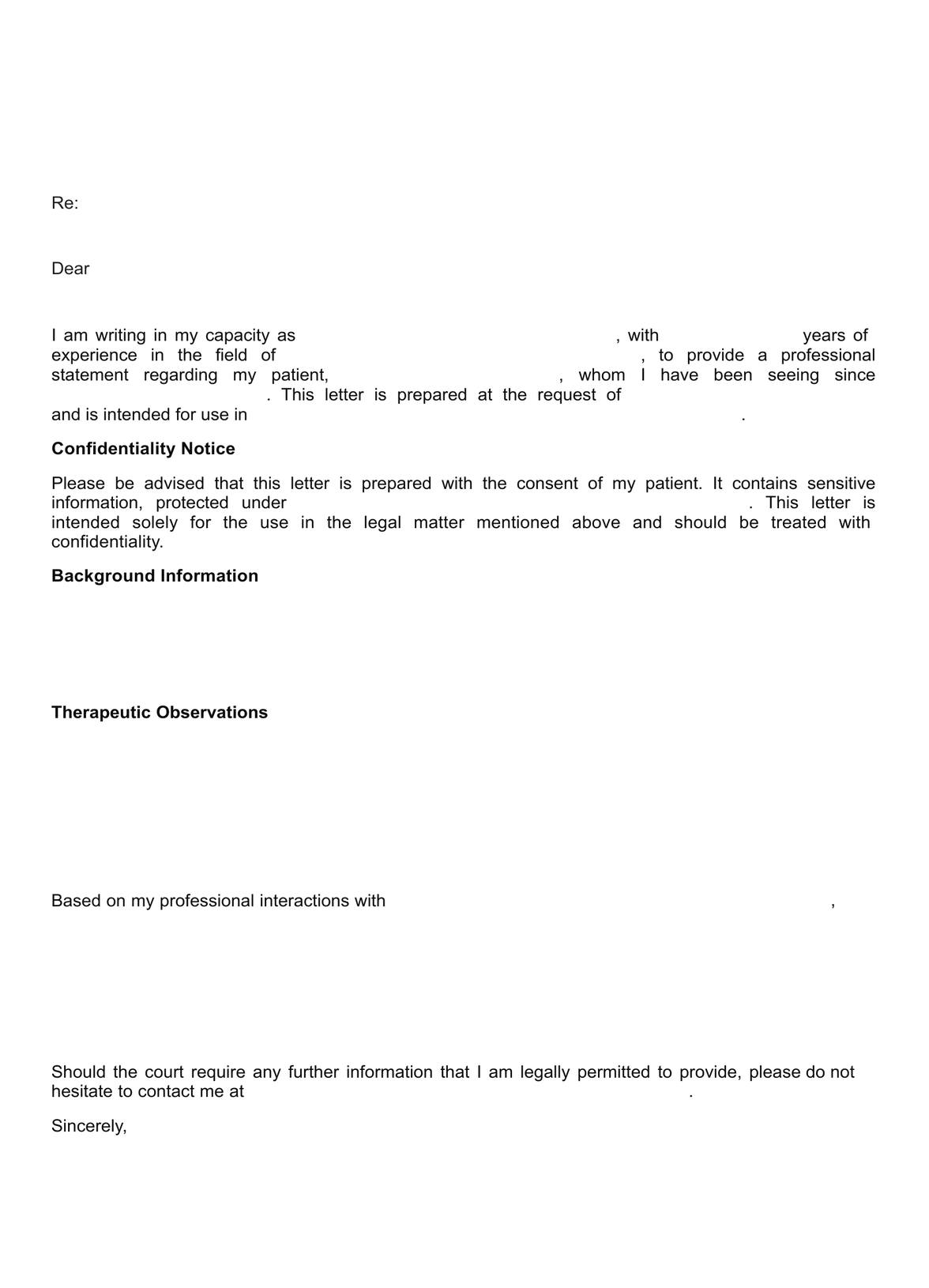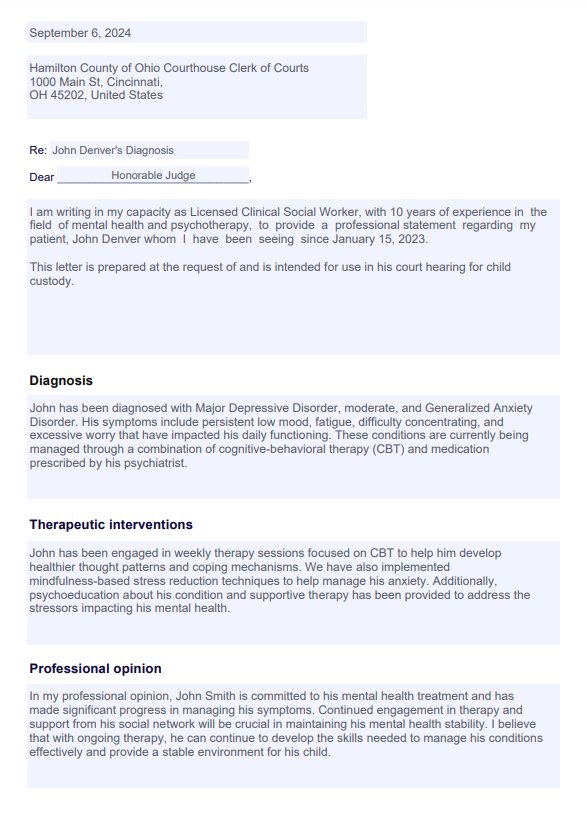
Explore our guide on writing Therapy Letters for Court, offering templates and insights for therapists to support clients' legal cases effectively.

By Russell Tan on Jul 15, 2024.


A therapy letter for court is a document written by a mental health professional that outlines a client's mental health status, treatment history, and progress. It may also include the therapist's professional opinions on the client's condition, recommendations for further treatment, and, in some cases, their perspective on the client's legal situation. This letter gives the court relevant psychological insights that may influence court cases.
PDF Template Example PDF

First is the introduction. This section introduces the therapist's credentials, their relationship with the client, and the letter's objective, setting the stage for the reader. It clarifies the therapist's authority to discuss the client's case and mentions who has requested the letter.
This section delves into the specifics of the therapist-client relationship, including how long the therapy has been ongoing, the frequency of sessions, and the nature of the therapeutic engagement (e.g., individual, group, family counseling). It may outline the therapeutic goals, progress made, and the client's level of participation and commitment to the therapy process.
Here, therapists might include their professional client assessment, including any diagnoses made according to the Diagnostic and Statistical Manual of Mental Disorders (DSM) or other relevant diagnostic tools. The therapist will describe the client's mental health issues, behavioral patterns, and how these may have impacted the client's actions or the circumstances that led to the court's involvement.
Outlined in this part is the summary of the client's progress, significant improvements, or challenges, and responses to therapeutic interventions. It demonstrates the client's efforts toward change or addressing issues pertinent to the court case.
In this section, the therapist may offer expert judgment regarding the client's mental health status, prognosis, and readiness to reintegrate into the community or comply with court orders. This opinion is based on the therapist's clinical experience with the client and their professional expertise.
The letter concludes by summarizing key points, reiterating support for the client's continued therapy, or outcomes related to the court case. It closes with the therapist's availability to provide further information.
The therapist's signature authenticates the letter, accompanied by their printed name, credentials, and contact information for follow-up if needed.
Our template provides a structured approach for therapists writing letters to court or legal bodies, from starting with letterhead information to concluding with a signature. It guides the inclusion of essential details such as the patient's full name, therapy period, and the context of the letter's request, focusing on a professional statement about the patient's mental health based on the therapist's assessment.
The template ensures that therapists can convey detailed yet confidential information about the therapeutic context and patient progress. It encourages relevant observations about the court's concerns, advising caution with diagnostic labels to respect patient privacy. This template streamlines the process of writing letters for legal bodies, balancing information needs with confidentiality, and supporting the therapist's report and assessment in a professional manner.
Writing court letters can serve several important purposes and offer multiple benefits in legal contexts. Here are some of the key advantages:
A therapy letter provides objective, professional evidence of an individual's mental health status. It can offer insights into their psychological well-being, diagnoses, and the impact of any mental health issues on their behavior. This information can be crucial in cases where mental health is a significant factor, helping the court to understand the individual's circumstances more fully.
It documents the treatment history, including the therapeutic interventions used and the progress made by the individual. This can demonstrate the individual's commitment to addressing their mental health issues, compliance with treatment recommendations, and any improvements or setbacks experienced. Such documentation can influence sentencing, custody decisions, or the court’s recommendations for rehabilitation or therapy.
Therapists can provide professional recommendations regarding the individual's treatment needs, suitability for particular programs (like diversion programs or rehabilitation), and their risk or safety to themselves or others. These recommendations are based on the therapist's expertise and the therapeutic relationship with the client, offering the court valuable insights into the most appropriate and effective interventions.
In criminal cases, a therapy letter can support mitigation by highlighting factors such as the role of mental health issues in the individual's behavior, their efforts to seek treatment, and any progress they have made. This can lead to more lenient sentencing or alternative sentencing options that include mental health treatment.
The letter can advocate for the client's needs, whether related to ongoing mental health support, accommodations, or other considerations that might aid their rehabilitation or compliance with court orders. It underscores the importance of addressing these needs for the individual's long-term recovery and well-being.
It facilitates communication between the legal system and mental health professionals, ensuring that decisions are informed by a comprehensive understanding of the individual's mental health. This interdisciplinary approach can enhance the effectiveness of legal interventions, promote better outcomes for the individual, and support the broader goals of justice and rehabilitation.